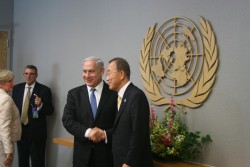 Less than six months after previous plans for early elections in Israel were scrapped in a failed attempt at a national unity government, a sooner-than-scheduled vote is back on the agenda. Israeli Prime Minister Benjamin Netanyahu announced the governing coalition he leads would end its tenure early in an effort to allow for a more expedited election season. The hope is that will enable parliamentary business to emerge from political pressures sooner. Of particular concern to Netanyahu—who is seeking re-election—is the passing of the next budget.
Less than six months after previous plans for early elections in Israel were scrapped in a failed attempt at a national unity government, a sooner-than-scheduled vote is back on the agenda. Israeli Prime Minister Benjamin Netanyahu announced the governing coalition he leads would end its tenure early in an effort to allow for a more expedited election season. The hope is that will enable parliamentary business to emerge from political pressures sooner. Of particular concern to Netanyahu—who is seeking re-election—is the passing of the next budget.
While Netanyahu did not say specifically when the vote would take place, he spoke of a three-month election campaign, which would move the elections forward more than half a year from their original date.
“At this time, in light of the two great upheavals around us, the security and the economic, my obligation as Prime Minister is to put the national interest above everything and therefore, I have decided that the good of the State of Israel requires going to elections now, as soon as possible,” said Netanyahu in a statement released by his office.
“The State of Israel would prefer a short election campaign of three months over what, in effect, would be a long election campaign that would continue for an entire year and would severely damage the Israeli economy. And therefore, after four years, we will go to elections.”
Netanyahu’s government has been one of the most stable in decades in a country where premature elections are the norm. It has still had to face political challenges, including the splintering of the coalition partner Labor party, in which Defense Minister Ehud Barak formed his own group, Atzmaut. A shrunken Labor then left the coalition and joined the opposition. In addition, an effort to bring the opposition-leading Kadima party into the government was a short-lived experiment.
The Knesset (Israeli parliament) is a coalition system in which multiple parties can form and dissolve the government. The new election will put the premiership of current-Prime Minister Netanyahu on the line, as the leader of the ruling party in the coalition is usually named the prime minister.
Getting his campaign off to a running start, Netanyahu praised the accomplishments of his government in the economic and security fields. He also viagra online no prior prescription explained some of the process behind his decision to move the elections forward.
“Today, I finished a round of consultations with the heads of the coalition parties and I came to the conclusion that it is not possible at this time to pass a responsible budget,” said the Israeli leader, who is also head of the Likud party. “We are on the threshold of an election year, and to my regret, in an election year it is difficult for parties to place the national interest ahead of the party interest. The result of this is liable to be a budgetary breach and a massive increase in the deficit, which would very quickly put us in the situation of the crumbling economies of Europe. I will not allow this to happen here.”
Netanyahu noted that for Israel, the risks are much higher than even economic trouble. “In the face of the regional upheaval and the global economic crisis, we must continue to uphold responsible economic and security policies because many challenges still lay before us: To ensure that Iran will not have a nuclear bomb, to defend our borders against terrorism and infiltration, to maintain the peace agreements with our neighbors, to uphold our vital national interests in any future peace negotiations and to ensure a dynamic and growing economy that will preserve jobs for Israeli citizens. All of this requires a responsible budget with long-range vision.”
Netanyahu—serving as prime minister for the second time but in terms separated by a decade—ended his comments with hopes to maintain his office. “I thank the citizens of Israel for the great privilege that has been given to me to serve you as Prime Minister and I seek a renewed mandate from the people to continue to lead the State of Israel.”
The Israeli political system is extremely diverse. The current coalition is a right-leaning government that includes religious parties, Netanyahu’s center-right Likud party and the center-left Atzmaut bloc.
That variety makes forming a coalition a complicated process with a wide-range of political interests to be considered. The opposition is currently led by the center-left Kadima party, although it’s left bloc-leadership is being challenged by other parties such as Labor.
(By Joshua Spurlock, www.themideastupdate.com, October 9, 2012)
